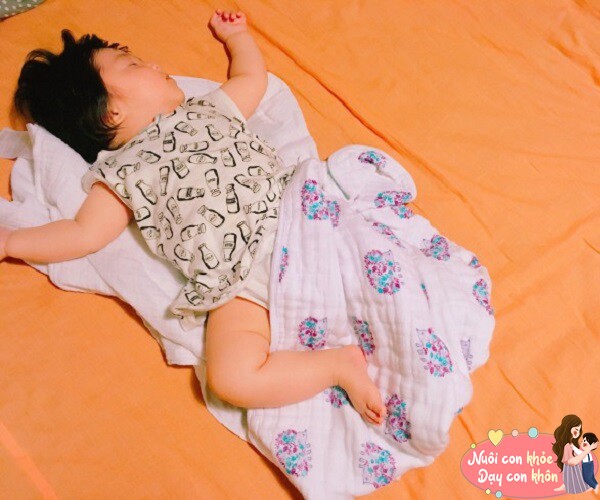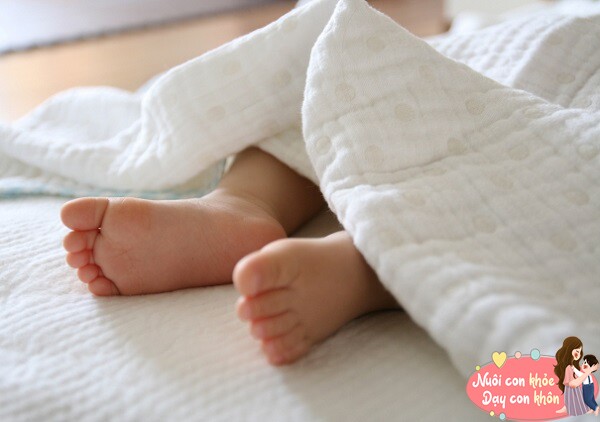Many children seem to have a knack for kicking off their blankets while sleeping. If you want to prevent your child from continuously kicking off their covers in the middle of the night, it’s essential to understand why they enjoy doing so.


Why Do Children Kick Off Their Blankets?
Over-excitement: The Brain Remains Active During Sleep
When children are overly excited before bedtime, their brains may remain active even during sleep. This can lead to a situation where they appear to be sleeping soundly, but their limbs continue to move restlessly, resulting in kicking off the covers.
In such cases, their sleep is not deep or restful, causing them to wake up in the middle of the night or feel tired upon waking in the morning.
To prevent this, parents should avoid engaging their children in vigorous activities like running, playing video games, or watching fast-paced television programs before bedtime. Instead, create a calm and cozy environment for them to relax and prepare for sleep.
Illness: Feeling Unwell Can Disturb Sleep
When children are unwell, they may sweat more and generally feel uncomfortable sleeping at night. This can lead to restlessness, blanket kicking, and even waking up in the middle of the night due to difficulty finding a comfortable position. These are signs that your child is struggling to relax and may feel irritable the next morning.

Over-excitement can lead to active brain during sleep.
Therefore, parents need to be vigilant and observe timely if their child is feeling unwell. Monitoring signs such as body temperature, activity levels, and other symptoms like coughing, runny nose, or muscle aches can provide a clearer picture of their health. If you notice any persistent or worsening symptoms, consult your pediatrician for advice and timely treatment.
Additionally, ensure your child’s bedroom is well-ventilated and maintained at a comfortable temperature, neither too hot nor too cold. Using lightweight blankets and dressing your child in breathable, soft fabrics can also enhance their comfort during sleep.
Heavy Pajamas or Blankets: Dress for Comfort
Another possible reason for blanket kicking could be that your child is wearing overly thick pajamas or is burdened by a heavy blanket, making it difficult to breathe. Even infants have their own preferences, and if they feel uncomfortable or constrained, they will express it through physical actions.
Parents should observe their child’s behavior and, if necessary, make adjustments to create a more conducive sleeping environment.

Why Do Infants Often Stick Their Legs Out While Sleeping?
There’s a scientific explanation for this seemingly odd but common behavior.
For a good night’s sleep, our body temperature needs to drop by about 1°C. This isn’t just a response to the environment; our skin also plays a role in temperature regulation.
As we fall asleep, our hands, feet, and head start to lose heat to lower our body temperature.
Specifically, our palms and soles have vascular structures called arteriovenous anastomoses, which allow blood to spread over a large area near the skin’s surface and cool down, effectively regulating body temperature.
In other words, as we drift off to sleep, our hands and feet warm up to dissipate heat and cool our bodies. However, if these areas are covered by blankets, the heat dissipation process is hindered.
This also explains why children often kick off their blankets multiple times during sleep.

Many infants tend to stick their legs out while sleeping.

How Can Parents Tell If Their Child Is Too Cold or Too Warm?
A simple yet effective way to gauge your child’s temperature is to feel the back of their neck. This area, especially the nape, provides a more accurate indication of their temperature compared to other parts of the body, such as the hands and feet, which can be influenced by the surrounding environment.
Before placing your hand on their neck, ensure your hand is warm enough to perceive the temperature accurately. A cold hand may give a misleading impression. This is crucial because an inaccurate perception can lead to dressing your child inappropriately for the weather.
If your child’s neck feels warm, they are neither too cold nor too warm, and their clothing is adequate. However, if their neck feels cool, it’s a sign that they need an extra layer of clothing to stay warm.
On the other hand, if you notice sweating or dampness on their neck, it means they are overdressed, and you should remove a layer to prevent discomfort and potential temperature dysregulation.

Checking the temperature at the back of the neck helps determine if your child is too cold or warm.

What Can Parents Do to Prevent Blanket Kicking?
Regulate the Indoor Temperature
One crucial factor influencing your child’s sleep is the temperature of their bedroom. Ensure the room is neither too hot nor too cold, ideally maintained between 20-22°C.
If the room feels too warm, consider opening a window for ventilation or using a gentle fan. Conversely, if it’s too cold, make sure your child is dressed warmly but not too tightly, allowing for comfortable movement.

Maintain a comfortable indoor temperature for your child’s sleep.
Avoid Late Night Snacking
Eating too close to bedtime can disrupt your child’s sleep. Refrain from giving them heavy meals or sugary snacks before they go to bed.
Instead, if they feel hungry, offer a light snack like milk or fruit at least 1-2 hours before bedtime. This helps them sleep better and avoids feelings of fullness or indigestion.
Choose Comfortable Sleepwear
The right sleepwear can also contribute to your child’s comfort during sleep. Opt for soft, breathable fabrics like cotton or linen, which allow for better airflow and prevent overheating.
Additionally, choose sleepwear with simple designs, avoiding excessive details or embellishments that might irritate your child and disrupt their sleep.
How to Keep Your Family Healthy with Smart Fan Technology
With the summer heat in full swing, many families are looking for ways to cool down in their homes. However, did you know that using a fan correctly could help protect your family from heat-related illnesses? We’ve got some simple tips to make sure you’re making the most out of your fan this summer!




































